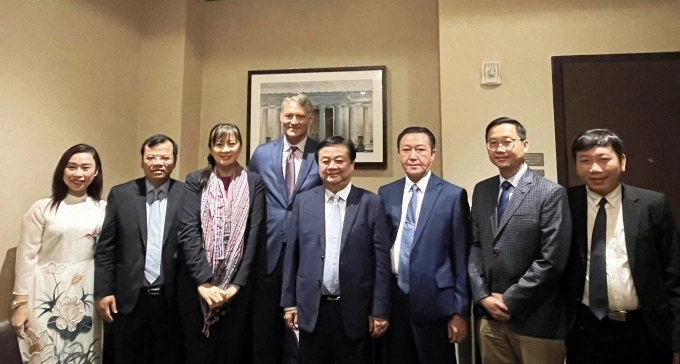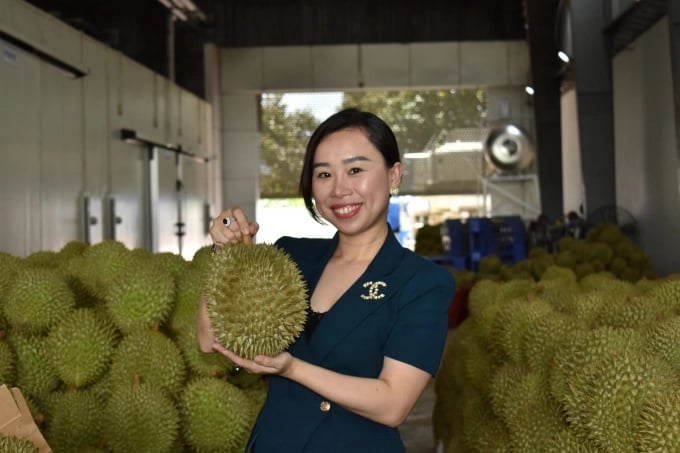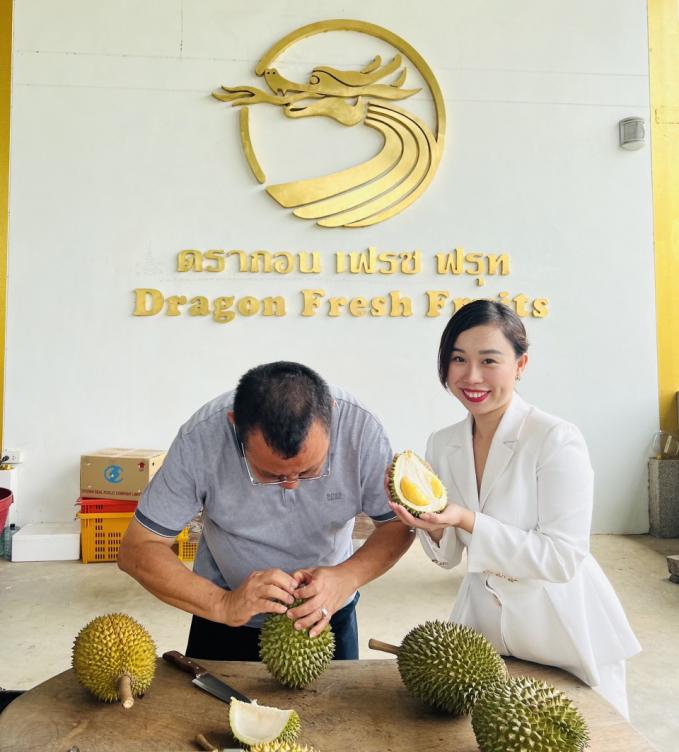June 16, 2025 | 12:59 GMT +7
June 16, 2025 | 12:59 GMT +7
Hotline: 0913.378.918
June 16, 2025 | 12:59 GMT +7
Hotline: 0913.378.918

Entrepreneur Ngo Tuong Vy (left) at a meeting between the Minister of Agriculture and Rural Development and Walmart in the United States.
Chanh Thu Import-Export Fruit Ltd.Co is well-known in the field of agricultural export for the first lot of mango exported to the United States in 2019, the first lot of lychee to enter Japan in 2020, and the leading fruit export business targeting "demanding markets" with an estimated output of 10 thousand tons and estimated revenue of VND 600 billion for the current year.
However, at the beginning of the conversation with Vietnam Agriculture News, Ms. Ngo Tuong Vy, Deputy Director of Chanh Thu Fruit Import Export Co., Ltd. talked a lot about her homeland, family, farmers, and beliefs.
A few years ago, the majority of Vietnamese believed that the Chinese market was the easiest. Chanh Thu established its criteria. We viewed it as a tough market, and the product quality was the value I wished to deliver to the Chinese people. We pioneered the development of Global GAP models for rambutan and other standards for other fruits to enhance consumer confidence, and we showed worldwide friends how Vietnamese agricultural goods were changed and standardized.
The Chinese market's trust served as a stepping stone for Chanh Thu to acquire the trust of numerous partners, customers, and consumers. Mango joined the U.S. market, lychee entered Japan, and green-skinned pomelo and many more fruits will soon be available on international markets. I have always believed that trust is one of the most crucial components in establishing a brand for Vietnamese agricultural goods.
My objective is very clear: to validate my worth, maintain the family business such that the brand name Chanh Thu generates customer confidence, and produce practical, enduring, and long-term value with my partners. And most significantly, I want to help establish the national brand for agricultural products.

Entrepreneur Ngo Tuong Vy: I want to contribute to promoting the brand name of national agricultural products.
Developing trust is a fundamental value, but the path must be tough. Because in our agricultural production chain, according to a large number of individuals, confidence is always abused. Particularly between farmers and enterprises, producers and customers... What actions did you and Chanh Thu take to fix these problems?
Your comment represents the bottleneck in our linking chain. The connection between businesses, cooperatives, and farmers has yet to be strengthened.
A long time ago, the Chinese market was so lucrative that our farmers relied on it. Consequently, when China has control over sanctions and becomes a difficult market, I am ecstatic, unlike many others. Because I recognize that thinking about the market is the bottleneck, the factor that decides whether or not the agricultural linkage chain can develop.
I believe that the changing nature of the Chinese market will present us with a chance to impose strict quality control measures on Vietnamese agricultural goods. Management agencies, businesses, cooperatives, farmers, and those participating in the linkage chain must come together to set criteria and position our agricultural products in which markets, they must be involved.
Previously, we established standards that all farmers and cooperatives affiliated with Chanh Thu must adhere to. Determining safe products in production links takes time, but it is a must for farmers.
There may not be much profit in the beginning, but the purpose of the partnership with Chanh Thu is to uncover the true value of Vietnamese agricultural goods and establish market confidence. Once this is accomplished, the product's worth will be returned to the farmer. In other words, the profit target may not be met a bit later, but it will be sustained. The attitude of the Japanese and Thai people has shifted for a very long time, and I hope that our farmers would follow suit to defend themselves and contribute to society.

Ms. Ngo Tuong Vy, Deputy Director of Chanh Thu Fruit Import Export Co., Ltd. Photo: Minh Dam.
As a pioneer who has successfully opened up difficult markets, what, in your opinion, are the obstacles in the "garden to the world" trip of Vietnamese agricultural products?
First of all, it must be affirmed that the market potential, especially for Vietnam's deep-processed fruit products, is still very large. As a result of the Covid-19 pandemic, Chanh Thu has transitioned from fresh fruit products to processed ones, particularly frozen durian products, and has attained some success. This achievement is the result of doing a market analysis, harnessing the competitive advantage of products, and developing a competitive market strategy.
I was fortunate enough to accompany the delegation of Prime Minister Pham Minh Chinh to the United States alongside Minister Le Minh Hoan. On this journey, expanding the market is a high priority, but my primary objective in the United States is to investigate how market demands and consumption patterns have shifted since the Covid-19 pandemic.
I acknowledged that more Americans are familiar with Vietnamese frozen durian and that it has captured one-third of the durian market in the United States, but it is still a modest percentage.
Following conversations and meetings with important customers and partners, I had the answer. According to what they told me, Vietnamese enterprises seem to like "competition" too much. This means that in the view of consumers and partners, Vietnamese enterprises compete with one another, even for a third of the captured market share. While this is uncommon for Thai enterprises, the pricing remains constant. Their durian has been on the US market for many years, and although being more expensive than Vietnam's, it has a greater market share than ours.
I wish that Vietnamese enterprises can connect, especially those who sell agricultural products to the United States. We have a moderate market share and a limited number of enterprises; thus, we must develop an effective strategy together.

Entrepreneur Ngo Tuong Vy visits a durian processing factory in Thailand. Photo: Photo courtesy of Ngo Tuong Vy.
During my May trip to the United States, I also attended a meeting between Minister Le Minh Hoan and Walmart to establish a connection between Vietnamese farmers and this global supermarket chain. At that meeting, a Walmart representative stated that the company was interested in purchasing Vietnamese mangoes, Vietnamese frozen durians, and many other fruit products that were more or less well-known on the US market, but the quantity brought into retail chains such as Walmart, Costco Wholesale, etc. was limited.
After the meeting, we had to immediately improve our link chain. I desire to collaborate with other firms on this endeavor. When we reach the retail chains of the world's largest organizations, our market is no longer limited to the United States.
Global firms with systems in several nations will constitute a tremendously big market, which Chanh Thu cannot possibly travel alone. Together, we must create trust and a national product brand to collaborate with multinational firms on the worldwide market. Shortly, I will stick to this objective and construct a development strategy for Chanh Thu.
To develop the market and establish a national brand, we must change. But do you believe that it will not be sufficient for the business or farmer to change?
We've discussed the problem and the obstacles extensively; let's now discuss the answer. I would want to illustrate a lesson from Thailand, our "rival" in several international agriculture markets.
The Thais have succeeded in developing policies and adhering to the legislation to establish consistent standards, putting them ahead of us. They understand how to promote farmers and companies using the nation's brand value story.

Entrepreneur Ngo Tuong Vy: Forming a mindset about quality standards has brought me success.
In the last two years, Thais have constructed a comprehensive set of regulations, legislation, and management teams regarding the quality of agricultural goods, particularly durian.
Obviously, when new laws and regulations were implemented, many companies and farmers resisted, but then the Thai people were committed and determined, and they ultimately succeeded. Due to this approach, the certified brand boosted the value of Thai durian by 20 to 30 percent.
I believe that Vietnam should immediately begin adopting this lesson. We boast more proper geographical and organizational edge over Thailand, so we can produce products year-round. The crucial question is how to capitalize on this advantage.
It is essential to establish practical titles, objectives, and strategies. From a personal standpoint, I require a clear role. The Ministry of Agriculture and Rural Development will be the input supplier, production organization, and product supplier for the Ministry of Industry and Trade to sell. The Ministry of Foreign Affairs will collect market information and promote products, while the Ministry of Science and Technology will assist businesses in updating to new technology, particularly deep processing technology. With such distinct tasks, coordination is also simplified.
“From mango to the U.S. market, to lychee to Japan, and shortly to green-skinned pomelo, when we talk with other nations regarding the market, Chanh Thu is always a pioneering firm eager to assume that responsibility. Because I believe that, regardless of whether the product has a large output or not, how much is exported, or if it generates more or less revenue, we must be a prerequisite for building a brand. I desire that Chanh Thu's brand would help strengthen the reputation of Vietnamese products", said Ngo Tuong Vy.
Thank you!
Translated by Linh Linh

(VAN) The working delegation from the Ministry of Agriculture and Environment conducted an important trip to the Netherlands to strengthen strategic partnerships and sustainable development in the agricultural sector.

(VAN) The letter ‘A Plea from the Ocean’ not only evokes emotion but also awakens the human conscience to the responsibility of protecting life on Earth.

(VAN) The Department of Agriculture in South Africa has announced the country’s first mass vaccination of poultry to prevent local birds from contracting avian influenza.

(VAN) Establishment of the Mekong Delta Regional Agricultural Linkage Center, aiming for a closed value chain, deep processing, trading platforms, and international market connectivity.

(VAN) Gia Lai province has recently recorded 460 rare species of animals and plants, contributing to forest conservation and biodiversity planning in the region.

(VAN) Ms. Caroline Beresford, New Zealand Ambassador to Vietnam, expressed confidence that agricultural cooperation between Vietnam and New Zealand will develop sustainably, be climate-resilient, and promote gender equality.

(VAN) Vietnam reaffirms its commitment to international cooperation in fostering sustainable and responsible fisheries while ensuring resilient livelihoods for small-scale fishing communities.